
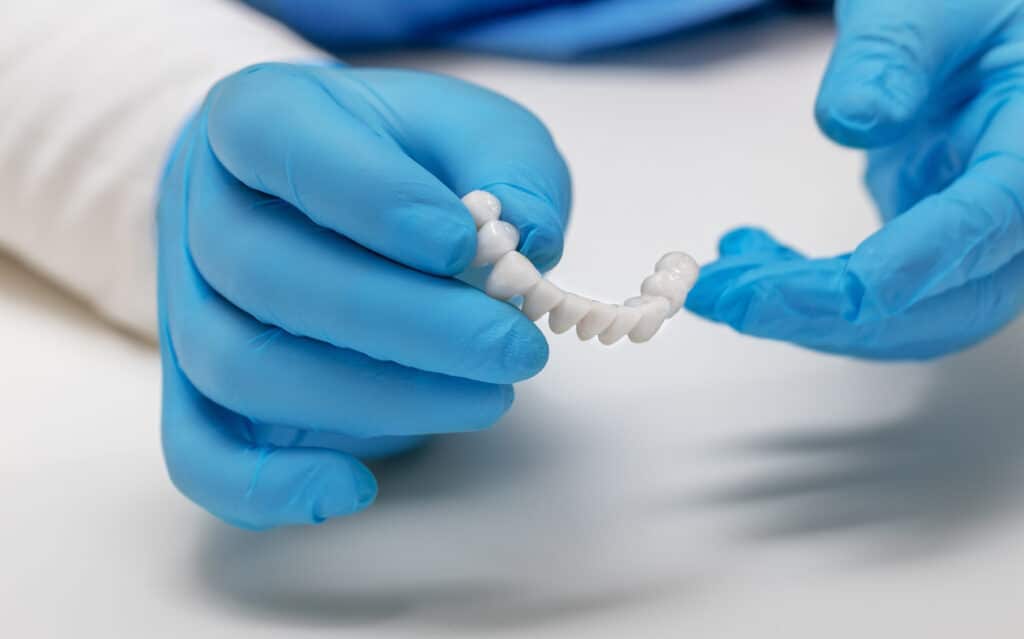
If you’re looking for treatment to replace a lost tooth, a dental bridge may be the perfect option. A dental bridge is a long-lasting way to replace missing teeth, and several different types are available depending on your particular needs.
At Blue Finch Dental Fulham we offer dental bridges as part of a comprehensive range of restorative dental treatments. We are a welcoming, family-run clinic in a peaceful first-floor location. We pride ourselves in clinical excellence and in explaining our treatments in simple, everyday language, enabling you to be fully involved in your treatment choices and to be confident in choosing the right treatments for you. Nervous patients are welcome.
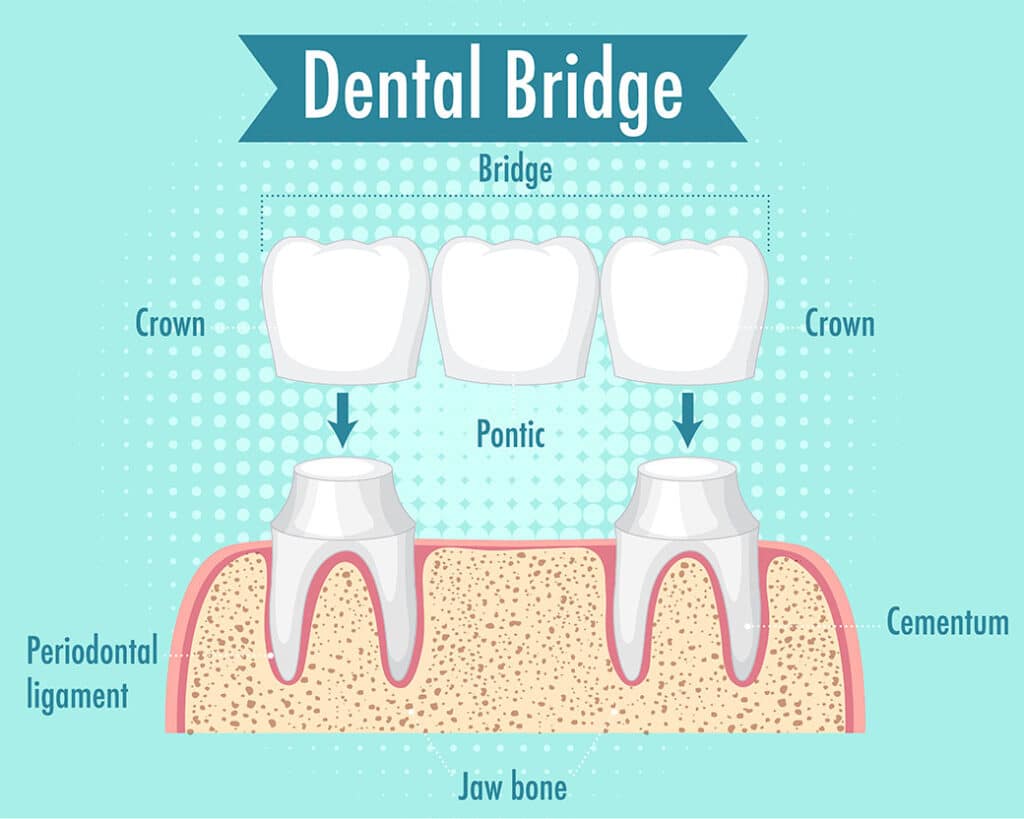
A dental bridge is a way to replace a single or multiple lost teeth, so called because it ‘bridges the gap’ between the two teeth either side (known as the abutment teeth) and the missing one in the middle. The bridge consists of a prosthetic (false) tooth called a pontic, permanently fixed to crowns on the abutment teeth, holding the pontic securely in place.
Bridges are designed to withstand biting and chewing forces just like normal teeth, and provide a simple and and permanent solution to a single missing or multiple lost teeth.

There are several common types of dental bridge, each appropriate to different clinical situations.
Traditional bridges: As described above, are suitable when you have a healthy tooth either side of the gap, to which the crowns can be fitted.
A resin-bonded bridge is different in that instead of being attached to crowns on the adjacent teeth, it is instead fixed glued to the tooth.
The advantage of a resin-bonded bridge is that the adjacent teeth do not have to be crowned. It can used to avoid unnecessarily crowning healthy teeth, and may also be cosmetically preferable if the missing tooth is at the front of the mouth, as the fixing is behind the teeth where it cannot be seen.
An implant-supported bridge is where the pontic is attached to dental implants rather than crowns. This is appropriate where there are multiple missing teeth, requiring dental implants to support the bridge, or if the teeth on either side are decayed or diseased and unable to support a traditional bridge.
At Blue Finch Dental, we will explain the most appropriate treatment in your particular case, giving you all the information you need to enable you to confidently make the right decision for you.
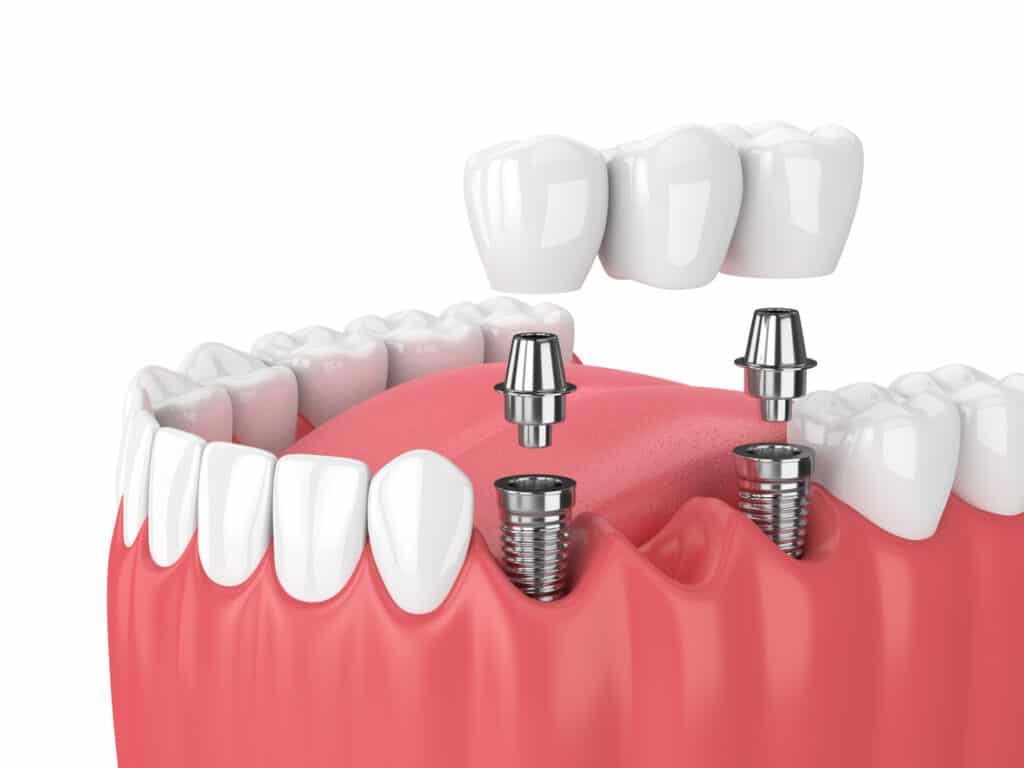
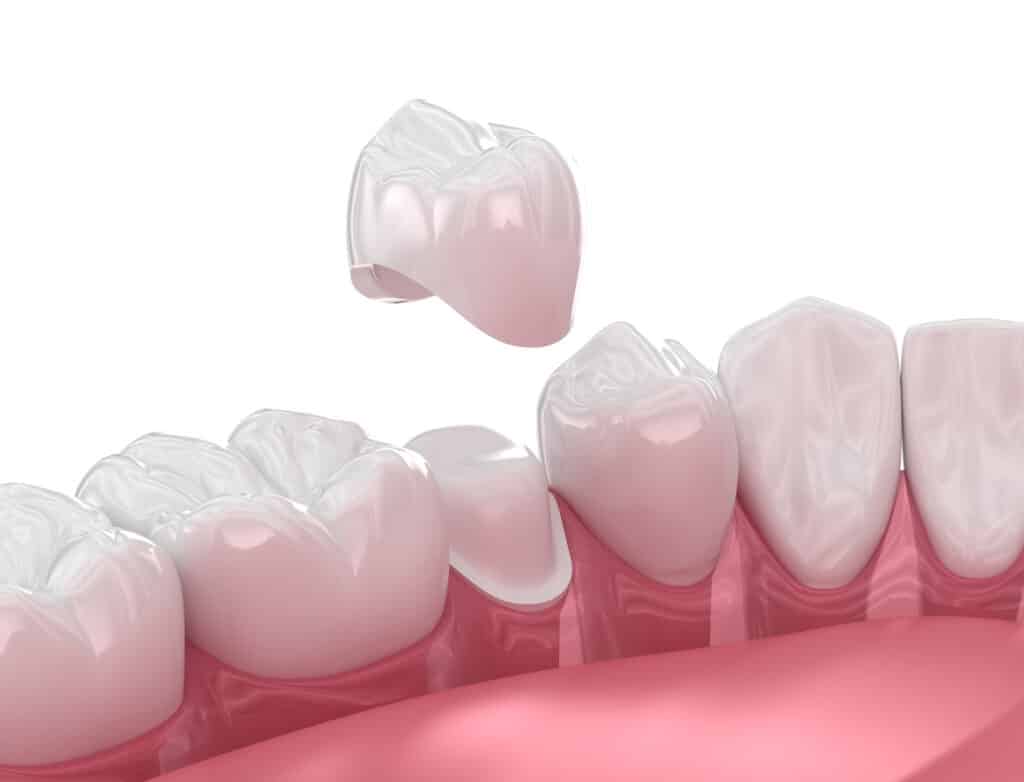
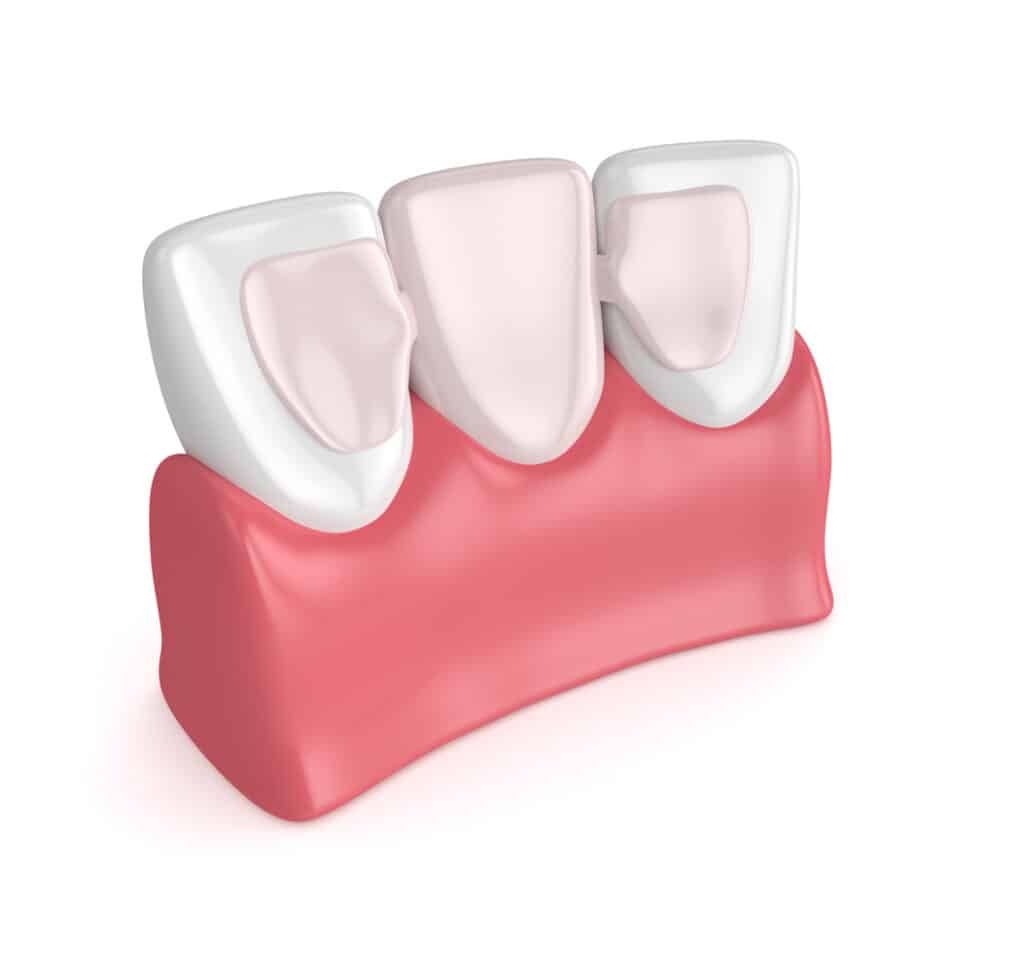
There are several common types of dental bridge, each appropriate to different clinical situations.
Traditional bridges: As described above, are suitable when you have a healthy tooth either side of the gap, to which the crowns can be fitted.
A resin-bonded bridge is different in that instead of being attached to crowns on the adjacent teeth, it is instead fixed glued to the tooth.
The advantage of a resin-bonded bridge is that the adjacent teeth do not have to be crowned. It can used to avoid unnecessarily crowning healthy teeth, and may also be cosmetically preferable if the missing tooth is at the front of the mouth, as the fixing is behind the teeth where it cannot be seen.
An implant-supported bridge is where the pontic is attached to dental implants rather than crowns. This is appropriate where there are multiple missing teeth, requiring dental implants to support the bridge, or if the teeth on either side are decayed or diseased and unable to support a traditional bridge.
Your dentist will explain the most appropriate treatment in your particular case, giving you all the information you need to enable you to confidently make the right decision for you.
Our helpful dentists are standing by to book your appointment and answer any questions you may have.
Depending on the particular situation, there are a few alternatives to replacing a missing tooth using a dental bridge.
The simplest option of course is to do nothing and leave the missing tooth missing. This is generally a viable option so long as the missing tooth does not trouble you cosmetically. However, it should still be discussed with your dentist as doing nothing may cause the surrounding teeth to shift, causing other problems.
Both fixed and removable dentures are also an option, either for a single missing tooth or for multiple missing teeth. These can provide a cheaper and less invasive option than bridging.
The tooth can also be replaced with a dental implant. This is where a titanium post is surgically implanted into the jawbone to replace the missing tooth root, to which the prosthetic tooth can be attached. This result will typically be longer-lasting, but is a more invasive, surgical treatment.
Generally, dental bridges are intended to be a long-term solution, and can last for many decades long time with the correct care and attention to your oral health. However they can may need to be replaced due to damage or trauma, decay of the surrounding teeth. Or for an ‘upgrade’ to a new and better material.
Dental bridges need little specific care beyond what any dentist would generally recommend to maintain good oral hygiene, e.g. brushing your teeth twice a day with a fluoride toothpaste and cleaning interdentally. Interdental cleaning is particularly helpful in the maintenance of bridges, to ensure plaque does not build up between the bridge and adjacent teeth.
Your dentist may also recommend specialist products to look after your bridge, such as an antimicrobial mouthwash or a particular brush or cleanser to help you reach any difficult areas between the bridge and adjacent teeth. It may also help to avoid biting into hard or difficult-to-chew foods with your bridge.
Also very important is to attend regular 6-monthly dental checkups where your dentist can monitor the condition of your bridge, and ensure any problems can be dealt with quickly.
My valued colleagues are hand-picked and have to demonstrate the highest level of clinical ability, and to be warm and friendly people who love looking after others.
Sometimes, we keep it in the family. My wife also plays a key role in Blue Finch Dental, ensuring our values of treatment excellence and family care are transmitted through the company.
Our helpful dentists are standing by to book your appointment and answer any questions you may have.

There are several stages to creating and fitting a dental bridge, requiring multiple visits to the clinic.
Following initial consultation and discussions and the choice to go ahead with a dental bridge, your teeth will be prepared for the bridge by removing part of the enamel on the adjacent teeth so they are suitable to hold the crowns parts of the bridge which will support it support the bridge. We will then take a mould or scan of the adjacent teeth and gap, which will be sent to the dental lab so your bridge can be created. The creation process may take several weeks, during which we may fit a temporary bridge to protect the teeth and gums and to restore aesthetics if necessary.
The lab will then create your bridge, which will be made to fit you perfectly and to match exactly the size, shape and colour of your natural teeth.
Once the bridge is complete, we will call you back to the clinic to ensure the bridge perfectly fits your mouth and that both you and your dentist are completely satisfied with the fit and appearance, before cementing it permanently in place.
Your dentist will then of course give you all necessary aftercare advice, and will be available to answer any questions or concerns you have in-between regular checkups.
Conventional dental bridges start from £700 per unit, whilst Maryland bridges start from £550. Your dentist will advise on any additional treatments which may be required, such as hygienist treatments before the fitting of the bridge.
We currently have introductory discounts on our treatments. Please see our fees page.

Clear retainers that invisibly realign your teeth, Invisalign® has become the biggest name in retainer technology for aduts.
We are a registered Invisalign® practitioner and can help you from answering your Invisalign questions through to the procedure and retainer fitting itself.
Contact us and one of our dentists will be in touch to answer all your questions about whether Invisalign might be the right treatment for you. Alternatively, have a look at our Invisalign page.

A good dentist is crucial for children! Our dentists are experienced in paediatric work and enjoy the fun that children bring to the clinic. From toys and games in the waiting area to modern, pain-free treatments and fun, relaxed staff, we are all set up to leave your children with beaming smiles!

We provide private emergency dental care in Fulham for both our registered and non-registered patients. Wherever possible we will make you a same-day appointment to get you treated and out of pain as quickly as possible. Contact us immediately and we will arrange your appointment.
Medical Review: The information on this page has been reviewed for accuracy by Tim Neill, lead dentist, Blue Finch Dental.
Our clinic is conveniently situated a stone’s throw from Fulham Broadway tube. We are located on a peaceful first floor away from the noise and bustle of the street, and have a lift for the less mobile.
We guarantee you and your family a warm welcome and a smooth, stress free dental experience. For full details of the clinic and a look around inside, just hit the button below.
Our helpful dentists are standing by to book your appointment and answer any questions you may have.